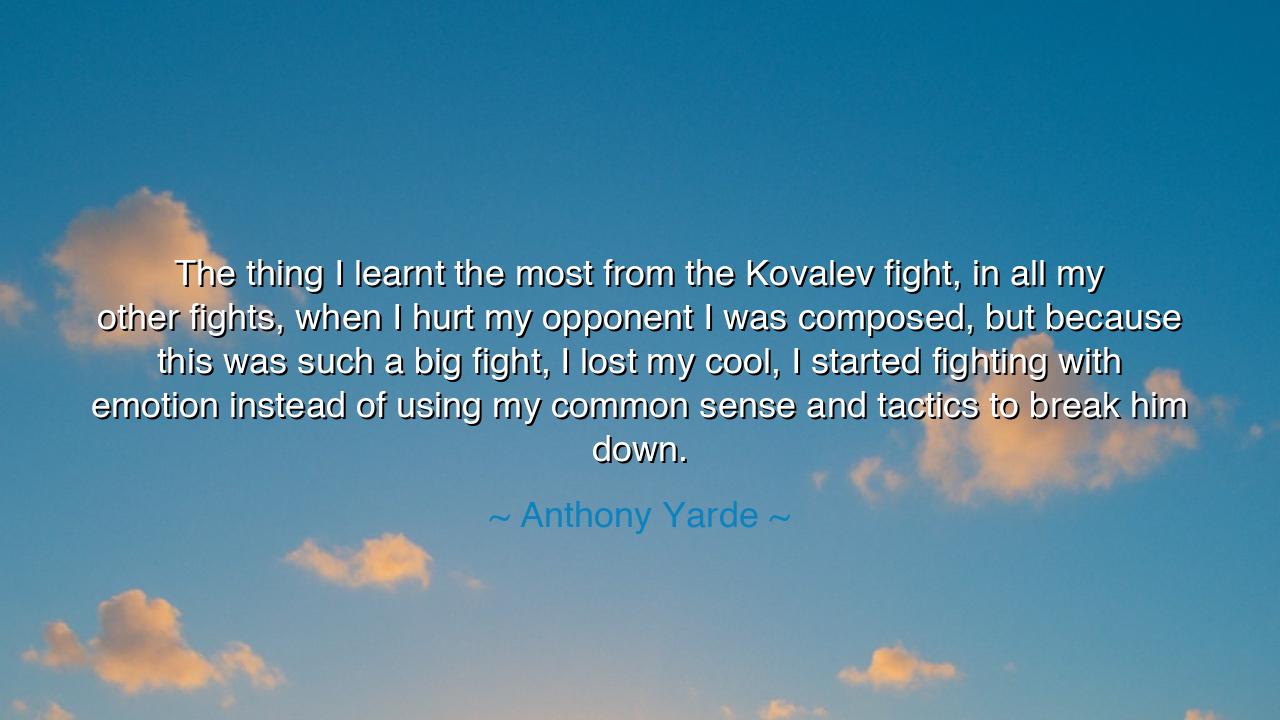
The thing I learnt the most from the Kovalev fight, in all my
The thing I learnt the most from the Kovalev fight, in all my other fights, when I hurt my opponent I was composed, but because this was such a big fight, I lost my cool, I started fighting with emotion instead of using my common sense and tactics to break him down.






"The thing I learnt the most from the Kovalev fight, in all my other fights, when I hurt my opponent I was composed, but because this was such a big fight, I lost my cool, I started fighting with emotion instead of using my common sense and tactics to break him down." With these words, Anthony Yarde reveals the deep, often humbling, truth about the balance between emotion and reason in moments of intense pressure. In the heat of battle, especially in something as personal as a fight, it is easy for the mind to become clouded by emotion—anger, fear, or the overwhelming desire to win—and lose the clarity that is essential for true success. Yarde’s reflection teaches us that self-control, the ability to remain composed in the face of adversity, is one of the greatest weapons we can wield, especially when the stakes are high.
In the ancient world, this battle between emotion and reason was at the heart of many of the great philosophical discussions. Aristotle, in his Nicomachean Ethics, spoke of virtue as the balance between extremes, emphasizing the importance of moderation in all things. In particular, he stressed the value of being able to control one's emotions in the face of external stressors—whether they be fear, anger, or pride. Socrates similarly understood that wisdom was not simply about knowledge, but about self-control and the ability to act according to reason, not impulse. The ancient philosophers recognized that the most powerful leaders and warriors were those who, when faced with conflict, maintained their composure and relied on tactics and reason rather than the whims of emotion.
In the context of Anthony Yarde's fight with Sergey Kovalev, we see this ancient principle in action. Yarde, in the heat of the moment, became overwhelmed by the emotion of the fight—perhaps the pressure of the stage, the weight of the title, and the personal significance of the battle. When he hurt Kovalev, he allowed his emotion to dictate his actions, rather than adhering to the tactical approach that had brought him success in earlier bouts. This loss of composure serves as a powerful reminder that in battle—whether physical or metaphorical—one must always strive to remain centered, drawing upon reason, calm, and strategy rather than the temporary surge of emotion.
The ancient warrior often embodied this quality of emotional restraint. Alexander the Great, though known for his brilliance on the battlefield, was equally known for his ability to remain level-headed and strategic in the face of overwhelming odds. The decisive battles of his campaigns, such as the Battle of Gaugamela, were not won by brute force or sheer anger, but by the brilliant execution of well-laid tactics. Alexander’s ability to control his emotions and rely on reason in moments of extreme stress allowed him to outmaneuver and defeat opponents who might have been more physically powerful but lacked the same mental clarity.
Similarly, the Romans prized virtus, which was the ideal of courage, wisdom, and self-control. It was said that a true Roman general, when faced with crisis, would not be driven by the heat of passion but would remain rational and calculated, knowing that the future of the empire depended on reasoned actions. Julius Caesar displayed this quality on many occasions—his ability to keep his cool in the midst of a chaotic battle, or the calm with which he faced political turmoil, was often what made him successful, allowing him to seize opportunities where others would have faltered.
The lesson we can draw from Yarde’s experience and the wisdom of the ancients is profound: true strength is not merely about power or force, but about the ability to remain composed, to think clearly, and to act strategically under pressure. Emotions, though natural, can often cloud our judgment and prevent us from seeing the bigger picture. Self-control—the discipline to remain calm and focused even when the world around us seems to be spinning—is what separates those who merely react from those who act with purpose and wisdom.
In practical terms, this means that we must cultivate self-awareness and discipline in all areas of our lives. Whether we are faced with a challenge at work, in relationships, or in personal growth, the ability to stay composed and to make decisions based on reason rather than emotion is the key to success. Just as Socrates and Caesar demonstrated, we must train ourselves to meet adversity with clear thought and strategic action, rather than falling into the trap of knee-jerk emotional responses. By doing so, we can achieve not only success in battle, but success in life.
As we go forward, let us remember that strength is not in the power of the moment, but in the clarity of mind that enables us to stay the course. Let us seek to channel our emotions into productive action, using them as tools rather than obstacles. And like Anthony Yarde, let us learn from our losses, acknowledging where we faltered, so that in the future, we may approach every challenge with the balance of wisdom and the strength of calm resolve. Through this, we will find true victory, not just over opponents, but over ourselves.






AAdministratorAdministrator
Welcome, honored guests. Please leave a comment, we will respond soon